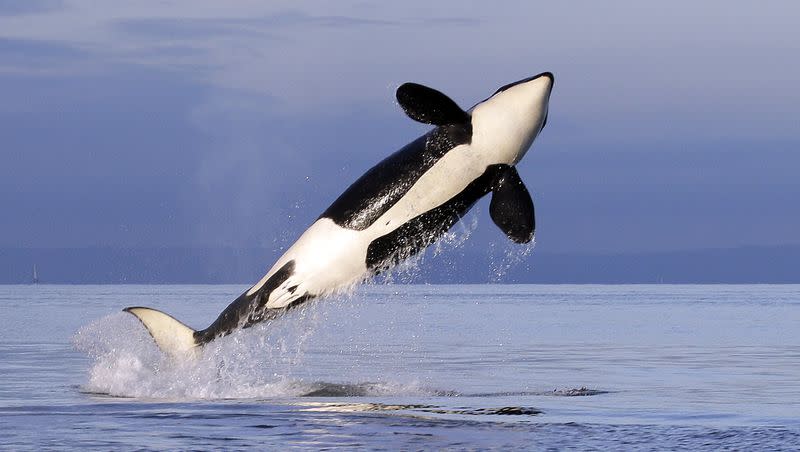Orcas are still ramming into boats. And the internet can’t get enough of it

Orcas have started ramming into boats and rudders to the point of breaking the boats, and it doesn’t appear to be slowing down yet.
All of the incidents have involved “some combination” of 15 killer whales, which have wrecked three vessels and disabled dozens of others. Cases of orcas interacting with the boats in this way has hit a record-breaking 20 to 25 per month. None of the people on board the vessels have experienced injuries so far, according to AccuWeather.
There are two theories scientists have established as explanations for the interactions. One could be that the orcas are just being playful. The other is that an orca experienced a traumatic experience with a boat and is trying to prevent it from happening to another orca again, per AccuWeather.
The phenomenon is unprecedented, and orca researcher Alfredo López Fernández told BBC that there have been cases of orcas interacting with boats in the past, but “none of them is similar to what’s happening now.”
One of the leaders in the pod of killer whales leading the pack who scientists believe first initiated the behavior is named White Gladis. Scientists believe White Gladis was likely pregnant when she first starting approaching the boats, which led scientists to assume something happened that caused White Gladis to act “out of revenge because of the trauma she experienced,” according to LiveScience.
“She went to the boats with this calf, so she preferred to stop the boats rather than keeping her baby safe,” Mónica González, a marine biologist, said in a webinar, per LiveScience. González continued, “it was more important to stop the boats” than to stay close to her calf, which is most commonly the behavior of mother orcas during the first two years of the baby’s life.
Scientists and researchers are following the situation to see if more developments occur.
People following the developments with the orcas took to Twitter to express support for the orcas.
I want all the orcas to know i’m on their side during this revolution https://t.co/iiLKonsgDh
— kira 👾 (@kirawontmiss) June 25, 2023
Orcas to one another: https://t.co/v2LEAlDG4A pic.twitter.com/Oeyn4gQuDh
— Morgan Jerkins (@MorganJerkins) June 27, 2023
Orcas have learned to hack https://t.co/Gmssa9Mf1i
— Sophia Banks .bsky.social (@sophiaphotos) June 29, 2023
This is what the orcas have been practicing for.
This is their Olympics.
This is their Mount Everest. https://t.co/cqwUN68YPd— Mvelase 🏳️🌈✊🏾🏳️⚧️ (@MvelaseP) June 29, 2023
Millennials grew up on Free Willy, there no way they're turning us against the orcas I'm sorry it's not happening https://t.co/zrM7bfrxfk
— CQ 🍳 (@concernedqueer1) June 21, 2023
having achieved naval dominance, the orcas are now taking control of the sky pic.twitter.com/FQJRGJFdDS
— Steven (they/them)🌈💜🤍🩶🖤 (@zencoffeebreak) June 25, 2023
I wonder if we can raise our hands in the sky to give our collective energy to the Orcas like a spirit bomb https://t.co/5gbNUieSGi
— Zito (@_Zeets) June 27, 2023
can one of the cancer moons out there please ask the orcas whats going on
— 🔱 Empress Atlantis 🔱 (PARODY) (@empressatlantis) June 23, 2023
I really like the game BATTLESHIP but to make it more accurate it should come with some plastic orcas and they get extra guesses.
— Gail Simone 💙💛 (@GailSimone) June 28, 2023
the orcas have taken their demonstrations to land https://t.co/wm9VQoNGkA
— monica jerimovich (@waystarroyhoe) June 29, 2023

